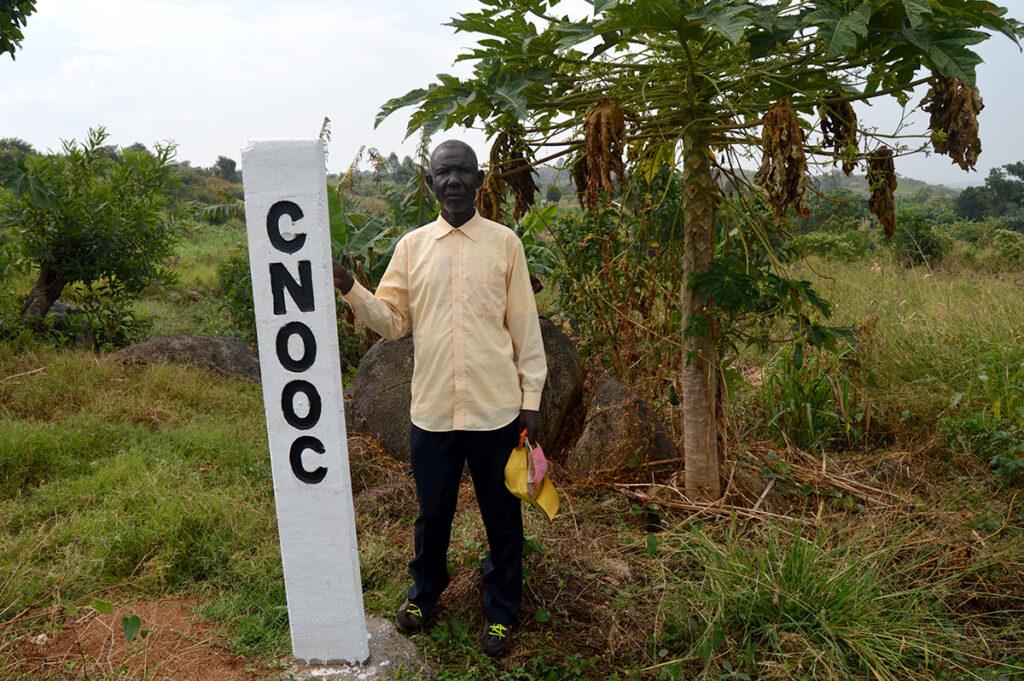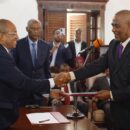“My house is crumbling”: Living in limbo along the East Africa pipeline

People along the route of the proposed 1,443 km oil pipeline talk of confusion, uncertainty and lives on hold.

Okecha Cibojo, a farmer in Nyamtai village, Kikuube District in Western region of Uganda standing by CNOOC beacons marking the route of a feeder pipeline for Kingfisher project. Credit: Maina Waruru.
Following the recent signing of accords, the construction of a hugely controversial oil pipeline in East Africa has come one step closer. On 11 April, Uganda and Tanzania approved three key agreements with oil companies Total and CNOOC, paving the way for building to begin on what would be the world’s longest electrically heated oil pipeline.
Before the signing, 260 charities had urged banks not to finance the $3.5 billion project. “No responsible bank should finance the East African Crude Oil Pipeline (EACOP) project well knowing that the economic, environmental, climate change and social risks of the project are too immense,” it read. After the signing, a further 38 civil society organisations in Tanzania and Uganda accused the project of ignoring environmental concerns and lacking transparency.
Much of the criticism of EACOP has focused on its environmental impacts. The pipeline is set to transport oil from the Tilenga and Kingfisher projects near Lake Albert in western Uganda 1,443 km to the Tanzania seaport of Tanga. Experts warn that the project risks polluting lakes and rivers and destroying invaluable biodiversity. And this is before considering the effects of the carbon emissions that will be released from extracting and burning the estimated 230,000 barrels of oil that will be produced each day.
For the communities that live in the areas where the pipeline is set to be built, however, concerns around the project are much more immediate. According to the #StopEACOP campaign, 12,000 families are set to be displaced by the pipeline. Many of these individuals told African Arguments that they have been in limbo since they were told they would receive compensation for their land and be relocated two years ago. Many are unsure of their fate even now construction has been approved and could remain so for some time yet.
“My house is crumbling. It’s in a state of disrepair and I want to repair it, but I cannot since I do not know when Total and the government will ask me to leave,” says Sserwadda Emanuel, a 35-year-old farmer who owns a 12-acre parcel of land in Lwengo district, central Uganda. “What would happen if I repaired it today then tomorrow they came and asked me to demolish it?”
His mother, Kolukiko Elivayida, adds that the eucalyptus trees and coffee bushes on her land have grown much bigger since evaluators visited in 2019.
“When they came to value assets, they placed the value of each tree at UGX 10,000 ($2.75), but they are now taller,” she says. “Will they still pay me at the same 2019 rates? I want them to come and assess the plants afresh.”
People expressed similar complaints in Hoima, Kikuube and Bulisa districts in western Uganda. In the village of Nyamtai, a series of markers cut through Okecha Cibojo’s farm, showing where the pipeline will run. For years, he too has had to adapt to uncertainty and a lack of information.
“I have not been able to use my land for perennial crops such as cassava over the past three years, which is the staple here, due fears of losing them without compensation,” he says. “Instead I grow fast maturing crops such as sweet potatoes or beans. This does not leave me and my family food secure.”
He says that he changed crops based on instructions from the surveyors who said the government would take his land soon. His experience of the evaluation has been one of opaqueness and ambiguity. “We also do not how they arrived at the value of land,” he says. “Different parcels have been given different valuations per acre”.
In response to these complaints, Ernest Rubondo, Executive Director of the Petroleum Authority of Uganda, insisted that the assessment of lands was done “meticulously and transparently” in the presence of local leaders, government representatives and a translator if needed. He said that people affected by the project would have three months to vacate once compensation was paid and that “the compensation package also includes a disturbance allowance, which takes into consideration of the time lapse”.
Some are not reassured. For others meanwhile, it has been impossible to even get a promise of compensation due to difficulties in proving ownership of land.
“Most people here have no title deeds,” explains Kayinga Muddu Yasita, head of the local Community Transformation Foundation Network (COTFONE). “The documents are held by one or two persons in an extended family and acquiring them is challenging bureaucratic process.”
He adds that communities’ cultural rights are also at risk. “We are asking on behalf of the people what will happen to communal burial grounds and family cemeteries affected,” he says. “Will families giving way to the pipeline move the bodies to wherever they will relocate to or will EACOP bury them afresh elsewhere?”
Ongoing uncertainty
The recent agreements between the Uganda, Tanzania and the oil companies arguably gives communities along the proposed pipeline a greater deal of certainty. But campaigners insist that the battle is not over. Those behind the project insist that it is meeting all the necessary standards and has undertaken environmental and social risk assessments. But activists refute this and are calling on banks not to the fund the controversial project.
“The oil companies are trying to dress up the investment decision signing ceremony, but fortunately this climate-destroying project is far from a done deal,” David Pred of Inclusive Development International told The Guardian. “Total and CNOOC still need to secure insurance and raise $2.5bn in debt financing for the EACOP to move forward and they are going to struggle mightily to find enough banks and insurance providers willing to associate themselves with such a project.”
This unclear situation reflects the uncertainty that many people have felt over the last few years amid a lack of clear communication or compensation from the government and oil companies. The experience of Charles Namugera, a farmer in Lwengo, encapsulates the limbo many are facing.
“We cannot use expensive fertiliser or tend to coffee trees on about three quarters of an acre of land because the portion now technically belongs Total and they could come for it at any time,” he says. “But can we say that Total owns it when it has never paid for it?”
“We have been told by our leaders that they will ask Total for jobs for our children, for provision of water and roads in this area as hosts of this pipeline, but we have seen nothing yet”.
Total, CNOOC and EACOP did not respond to requests for comment.







Perfectly indited content, Really enjoyed looking through.